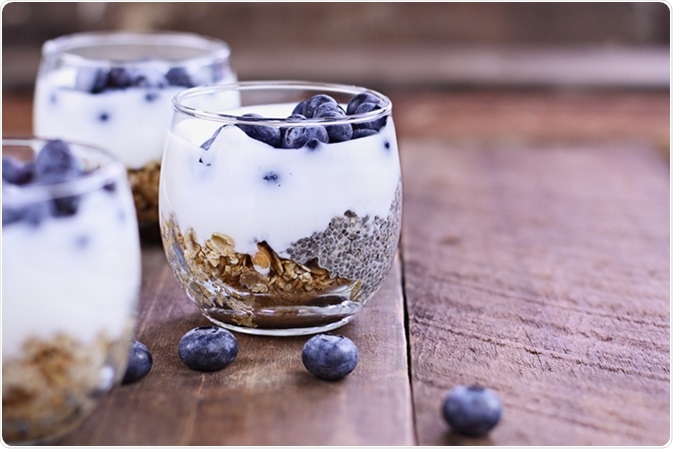
Supplements During Pregnancy
Pregnancy increases a woman’s need for micro- and macronutrients to address the nutritional needs of the growing baby and her own body's increased nutritional needs. Vitamins and minerals play a key role in maternal and fetal growth during various stages of pregnancy and are critical for cell growth and signaling.

Image Credit: OndroM / Shutterstock
Should I use supplements during pregnancy?
It is difficult for most pregnant women to get all those extra nutrients from the food they consume. Some reasons why they need to consume prenatal supplements include:
- Hyperemesis gravidarum (or severe morning sickness): This pregnancy-related complication of severe nausea and vomiting can result in weight loss and deficiencies.
- Dietary restrictions: Pregnant women who have allergies or follow a specific diet such as veganism may need to take vitamins and mineral supplements to compensate for poor intake of certain micronutrients.
- Nutrient deficiencies: Blood tests in some pregnant women reveal vitamin or mineral deficiencies that can adversely affect the growth of the baby.
- Smoking: Though most women quit smoking during pregnancy, there are some who continue to smoke. They need more folate and vitamin C than non-smoking women.
- Multiple pregnancies: Women pregnant with more than one baby obviously need more micronutrients than women who carry one baby. Hence they need supplements to support optimal nutrition for the babies as well as the mother.
- Poor diet: Some women have poor eating habits which affect their health as well as the baby’s during pregnancy and hence they need to take vitamin and mineral supplements to avoid nutritional deficiencies.
According to the American Congress of Obstetrics and Gynecology, all pregnant women should take prenatal folate supplements to prevent birth defects in the baby.
Which prenatal supplements are important?
Folic acid: Folic acid (or folate) is a B vitamin that plays a key role in the development of the baby's brain and spine. Folate deficiency during pregnancy can cause birth defects in the newborn’s brain or spine, called neural tube defects, and also cleft lip and congenital heart disease.
It is important to start folic acid early in pregnancy, or ideally, before pregnancy, as these birth defects often develop even before women find out they are pregnant. Recommended levels of prenatal folic acid supplements are 400 micrograms a day in addition to their regular dietary intake.
Iron: Pregnant women require extra iron to keep their blood healthy and increase the blood’s ability to carry oxygen to the cells. Also, the growing baby needs to store some iron for use in the first few months after birth. Iron deficiency can cause anemia, which causes tiredness and shortness of breath. Recommended amount of prenatal iron supplement is about 27 milligrams per day.
Vitamin D: Vitamin D is a fat-soluble vitamin critical for bone health, immune function, and cell division. Deficiency of vitamin D during pregnancy increases the risk of preeclampsia, preterm birth, C section delivery, and gestational diabetes. The recommended vitamin D supplement intake for pregnant women is 600 IU per day.
Fish oil: Fish oil is a good source of two essential fatty acids, eicosapentaenoic acid (EPA) and docosahexaenoic acid (DHA). Both play a crucial role in fetal brain development. Hence, some doctors recommend DHA and EPA supplementation during pregnancy to enhance infant brain development. However, study results are mixed about whether supplementation improves infant outcomes.
Probiotics: Probiotics are beneficial microorganisms that boost digestive health. Studies show that probiotic supplementation during pregnancy may lower the risk of postpartum depression, gestational diabetes, and infant dermatitis.

Kefir yogurt and chia parfaits. Kefir is rich in probiotics. Image Credit: Stephanie Frey / Shutterstock
A word of caution
An overdose of prenatal supplements can harm the baby and cause birth defects. Always consult with your physician before taking any prenatal supplements. Also, it is important to remember that prenatal supplements are not a substitute for a balanced and healthy diet.
Sources
Further Reading
Last Updated: Nov 19, 2018

































No hay comentarios:
Publicar un comentario